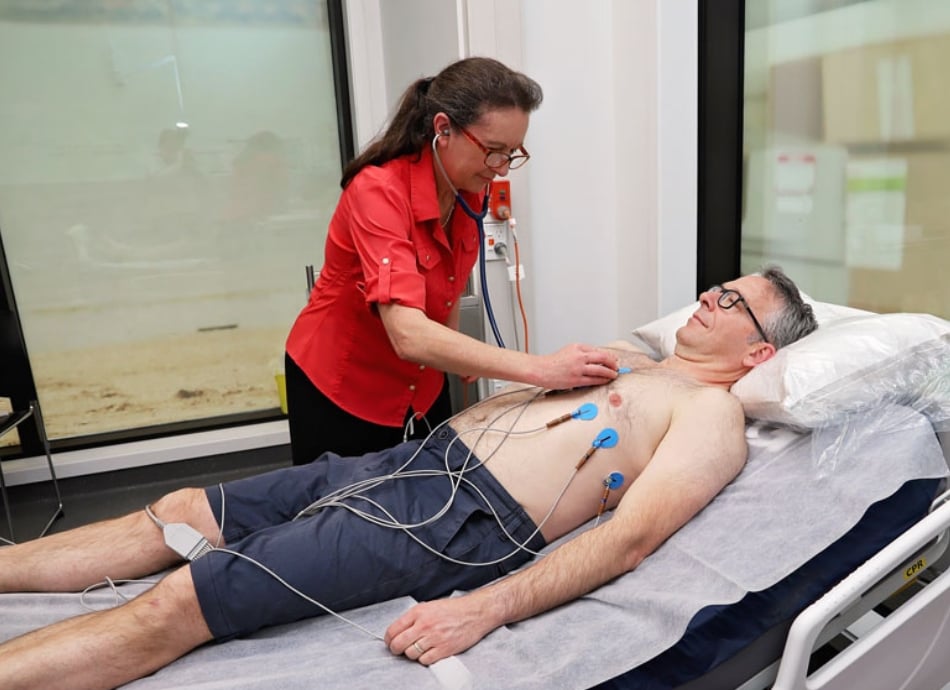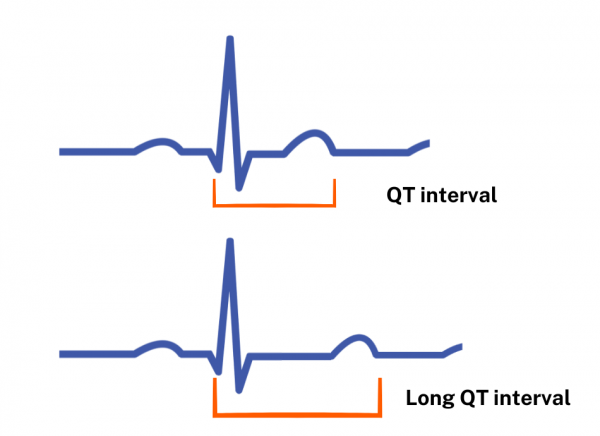You can now add Healthify as a preferred source on Google. Click here to see us when you search Google.
Long QT syndrome
Key points about long QT syndrome
- Long QT syndrome is a condition that affects the rhythm of the heartbeat.
- The name comes from the length of the heart's 'recharging' period, or QT interval, measured on an electrocardiograph.
- It can cause fast, chaotic heartbeats (known as arrhythmia), which may trigger a sudden fainting spell, or if the heart doesn't regain its normal rhythm it may cause sudden death.
- Long QT syndrome is treatable. You might need to take medications to keep your heart rhythm steady and regular. In some cases, surgery or an implantable device may be required.

Heartbeats are caused by electrical signals that spread across the heart muscle, causing the squeezing of the heart muscle and the heart's pumping action. The electrical activity of the heart is measured using a test called ECG (electrocardiograph). The ECG is recorded on paper as spikes and dips called waves. By assessing the pattern of these waves, your doctor can gauge the rhythm and the rate of your heartbeat. If you have long QT syndrome, there's an extra-long, prolonged interval between 2 distinct points on the ECG.

Image credit: Depositphotos and Healthify He Puna Waiora
The video below provides an overview of how the heart's electrical system works and long QT syndrome (LQTS).
Video: Long QT syndrome (LQTS)
You have an increased risk for long QT syndrome if other members of your family have the disorder. It's often inherited from a parent as a faulty gene (also called congenital long QT syndrome).
Medicines
Some medicines can trigger long QT syndrome (called drug-induced long QT syndrome). This usually happens in people with an inherited higher risk of developing it, such as those with slight genetic heart defects. Examples of medicines that may trigger long QT syndrome include:
- antibiotics such as erythromycin, clarithromycin
- antihistamines such as terfenadine (no longer available in Aotearoa New Zealand)
- antidepressants such as citalopram, escitalopram, lithium
- antipsychotics such as aripiprazole, clozapine, olanzapine and quetiapine
- heart medication such as flecainide, amiodarone, sotalol
- domperidone
- methadone.
Natural products, herbal supplements or dietary supplements
An example of a natural product that causes long QT syndrome is Artemisia annua. It's also known as Qing hao, Sweet Annie or Sweet Wormwood. It's used as dried herbs or extracts in several natural health products available in Aotearoa New Zealand. New Zealand doesn't have a register of herbal medicines or an approval system for natural products so a complete list of products containing Artemisia annua dried herb or extract can't be provided here.
If you're at risk of prolonged QT interval, or you're taking QT-prolonging medicines you should avoid products containing Artemisia annua. Carefully check the ingredients of any natural health product or dietary supplement before use. Ask your pharmacist for advice if you are unsure about the product.
See Drugs to avoid(external link) or CredibleMeds(external link) for a list of medicines that should be avoided. Be aware that these websites are not in New Zealand so some of the medicines names may differ.
Be careful
- Always check with your prescriber or pharmacist if you're not sure if the medicines you've been prescribed are safe.
- Be sure to tell them if you or a family member may have long QT syndrome.
Many people with long QT syndrome may not have any signs or symptoms. For those who do have symptoms, fainting, blackouts and irregular heart beat are the most common. These episodes can start at any age and may be triggered by:
- stress
- intense emotion (such as fright, anger, or pain)
- a sudden, startling noise such as an alarm bell
- strenuous exercise, particularly swimming
- a slow heart rate during sleep.
However, there isn't always a trigger. Children who are born with long QT syndrome may have at least 1 episode of fainting by the time they are 10 years of age. Others may just have 1 or 2 episodes of fainting as children, and then never have another episode again.
An ECG is the first test that you will have. You may need to repeat ECG recordings or have other tests, such as an exercise ECG.
There are special genetic tests which can be ordered if your healthcare provider suspects you may have a congenital (present from birth) form of QT syndrome. You may also be asked to have one of these tests if you have a close relative with long QT syndrome.
Long QT syndrome is most commonly treated with medicines called beta-blockers. These work by slowing your heart rate. They do not cure long QT syndrome, but they have been shown to reduce or prevent the symptoms. Read more about beta-blockers.
Depending on your symptoms and your risk of having a life-threatening arrhythmia, you may also need to have an implantable cardioverter-defibrillators (ICD) device fitted. These are devices placed inside your body to detect and correct abnormal heart rhythms. ICDs may be necessary if you don't respond to beta-blocker medicines.
If your long QT syndrome has been caused by medicines, these will be reviewed and adjusted so that you still receive the benefits without affecting your QT interval.
If your long QT syndrome is properly treated and controlled, you may not have to make many changes to your normal lifestyle. However, some adjustments may be needed:
- Discuss with your doctor if you need to avoid certain sports or activities that increase the risk of fainting or more serious events.
- Always check the suitability of over-the-counter medicines and supplements with your prescriber or pharmacist. Some may induce symptoms or react with the medicines you're taking to help reduce your risk of abnormal heart rhythms.
- Some people may be advised to avoid sudden startling noises such as alarm clocks or phones – you may need to turn your mobile phone off at night when you go to bed.
- Let your doctor know if you have prolonged (longer than a day) or severe episodes of vomiting (being sick) or diarrhoea (runny poo). This can affect your sodium and potassium levels, which can then affect the signals in your heart. You should discuss this situation with your doctor who may wish to prescribe oral rehydration supplements. These supplements can help to raise your sodium and potassium levels but should be used under medical supervision.
- Always let whānau and friends know about your condition, or wear a medic-alert bracelet, so that if you faint suddenly they know to call 111 immediately.
Long QT syndrome(external link) Starship Clinical Guidelines
References
- Long QT syndrome (LQTS)(external link) Cardiac Inherited Diseases Group, NZ, 2024
- Long QT syndrome(external link) Mayo Clinic, US, 2024
- Artemisia annua and QT interval prolongation(external link) Medsafe, NZ, 2019
- Update on the diagnosis and management of familial long QT syndrome(external link) Heart, Lung and Circulation 2016;25:769-76
- Long QT Syndrome(external link) Circulation 2014;129: 1524-1529
- Drug-induced QT prolongation and Torsades de Pointes – the facts(external link) Medsafe Update, NZ, 2010
Davies RA, Ladouceur VB, Grren MS. et al. The 2023 Canadian Cardiovascular Society clinical practice update on management of the patient with a prolonged QT interval(external link) Can J Cardiol. 2023; 39:1285–1301
Khatib R, Sabir FRN, Omari C, et al. Managing drug-induced QT prolongation in clinical practice Postgrad Med J. 2021;97(1149):452–458
Drugs to avoid(external link) www.sads.org.uk
Drugs categorised by their potential to cause QT prolongation(external link) CredibleMeds
Waddell-Smith KE, Skinner JR, et al. Update on the diagnosis and management of familial long QT syndrome(external link) Heart Lung Circ. 2016;25:769–76
Abrams DJ, MacRae CA. Long QT Syndrome(external link) Circulation 2014;129:1524–1529
Drug-induced QT prolongation and Torsades de Pointes – the facts(external link) Medsafe Update, December 2010
Credits: Healthify editorial team. Healthify is brought to you by Health Navigator Charitable Trust.
Reviewed by: Dr Art Nahill, Consultant General Physician and Clinical Educator
Last reviewed:





